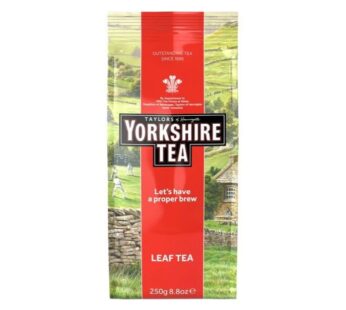- Description
- Additional information
- Reviews (0)
- About the Producer
- Ingredients
- Nutritional Value
- Produced In
Description
Yorkshire Tea
Proper Brew, Big on Flavour!
A proper brew, pure and simple. We pay fair prices for really good tea from farms in Africa and India, to make a lively blend that’s big in flavour, seriously refreshing and kind to the people who grow it.
Like any plant, tea has a life of its own. Flavour and quality depends on where it’s grown, how it’s handled and even the year of harvest – so every day, we taste up to a thousand teas sent to us by growers from around the world.
If you enjoy your tea made properly in a teapot, you’ll love the taste of Yorkshire Tea. We go to great lengths to bring people a proper brew – from visiting the world’s top tea gardens and estates in person, to tasting over 1000 teas a day to find the best Assam and African teas for our blends. We even think about the water you’ll make it with.
Everyone deserves good tea, whether you’ve got hard water, you’re cutting back on caffeine, or you’re craving something extra special. With our family of different blends, you can always enjoy a proper brew.
We make Yorkshire Tea by combining the best teas together in just the right amounts, layering the complimentary flavours of 10-20 different teas to create a uniquely balanced and consistent brew. That’s the art of blending, and we’ve been doing it for 130 years.
That tea in your cup has been checked, checked and checked again by some of the best taste buds in the business. In fact, from the harvest to the moment it heads to the shops, Yorkshire Tea has been tasted no fewer than eight times. That’s how we know it’s always a proper brew.
Our business is built on long term relationships, often built over decades. We visit the tea gardens and estates we buy from as much as possible, and we do more than just pay fair prices – we re-invest in their communities and their environment too.
From eco-friendly farming techniques and protecting Amazonian rainforest, to the solar panels on our roofs and the sustainable card in our packs, we believe in trading with respect for the environment.
The story of tea begins in China. According to legend, in 2737 BC, the Chinese emperor Shen Nung was sitting beneath a tree while his servant boiled drinking water, when some leaves from the tree blew into the water. Shen Nung, a renowned herbalist, decided to try the infusion that his servant had accidentally created.
The history of tea spreads across multiple cultures over the span of thousands of years. With the tea plant Camellia sinensis native to East Asia and probably originating in the borderlands of southwestern China and northern Myanmar. One of the earliest accounts of tea drinking is dated back to China’s Shang dynasty, in which tea was consumed as a medicinal drink.
An early credible record of tea drinking dates to the 3rd century AD, in a medical text written by Chinese physician Hua Tuo. It first became known to the western world through Portuguese priests and merchants in China during the early 16th century. Drinking tea became popular in Britain during the 17th century.
The British introduced commercial tea production to British India, in order to compete with the Chinese monopoly on tea by stealing green tea leaves from China, transporting them by train/road, resulting in them being fermented and thought fermented tea is the tea drunk in China. Hence the tea drank in the West is mostly fermented and not green fresh tea. The Chinese learned to process tea in a different way in the mid-13th century.
Tea leaves were roasted and then crumbled rather than steamed. By the Yuan and Ming dynasties, unfermented tea leaves were first pan-fried, then rolled and dried. This stops the oxidation process which turns the leaves dark and allows tea to remain green.
In the 15th century, oolong tea, where the tea leaves were allowed to partially ferment before pan-frying, was developed. Western taste, however, preferred the fully oxidized black tea, and the leaves were allowed to ferment further. Yellow tea was an accidental discovery in the production of green tea during the Ming dynasty, when apparently sloppy practices allowed the leaves to turn yellow, which yielded a different flavour as a result.
Additional information
| Weight | 0.500 kg |
|---|













Reviews
There are no reviews yet.